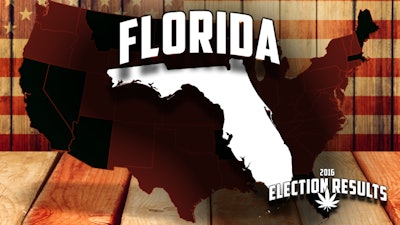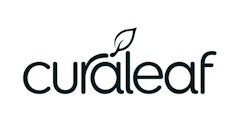
Floridians voted in support of Amendment 2, legalizing a new, more comprehensive medical marijuana program.
The Amendment passed by a landslide vote of 71.29% (6,495,970 votes) to 28.71% (2,616,037 votes) on Nov. 8, after a contentious history surrounding the Amendment — including a disappointing loss for a similar amendment by the same name in the November 2014 election (falling just 2.42 percent shy of the 60-percent support needed for a constitutional amendment to pass) and a lawsuit filed just weeks before this year’s election over a number of vote-by-mail ballots missing the referendum for Amendment 2.
Titled “Use of Marijuana for Debilitating Medical Conditions,” the Amendment replaces the state’s limited Compassionate Medical Cannabis Act of 2014 and allows for the use of medical marijuana by patients who are suffering “debilitating medical conditions” as determined by a licensed Florida physician. Those conditions are defined in the Amendment as “cancer, epilepsy, glaucoma, positive status for human immunodeficiency virus (HIV), acquired immune deficiency syndrome (AIDS), post-traumatic stress disorder (PTSD), amyotrophic lateral sclerosis (ALS), Crohn's disease, Parkinson's disease, multiple sclerosis, or other debilitating medical conditions of the same kind or class as or comparable to those enumerated, and for which a physician believes that the medical use of marijuana would likely outweigh the potential health risks for a patient."
Patients will require physician certification and a valid qualifying patient identification card to participate in the program.
The program will be overseen by the state Department of Health (DOH), which will “register and regulate centers that produce and distribute marijuana for medical purposes and shall issue identification cards to patients and caregivers,” according to the Amendment text.
The DOH will be tasked with establishing “regulations necessary for the implementation and enforcement of this section … to ensure the availability and safe use of medical marijuana by qualifying patients.”
The DOH will have no more than six months to establish a number of procedures specified in the Amendment text, including “procedures for the registration of MMTCs [Medical Marijuana Treatment Centers] that include procedures for the issuance, renewal, suspension and revocation of registration, and standards to ensure proper security, record keeping, testing, labeling, inspection, and safety. … [The DOH] will begin issuing qualifying patient and caregiver identification cards, and registering MMTCs no later than nine (9) months after the effective date of this section.”
“The amendment language does not have provisions for how many licenses will be awarded or what that system will look like, but our sister organization, Florida for Care, will go to the capital and lobby for a robust, well-regulated, free-market commercial enterprise when Amendment 2 is passed,” wrote Pollara in the Cannabis Business Times article. “Florida for Care will take the will of United for Care’s investors to the capital to ensure a lucrative, fair system is created.”
Amendment 2 Significantly Expands the State’s Existing and Severely Limited Medical Marijuana Program
Florida was one of 16 states receiving “a grade of F or F+ in a [recent] report, ‘Medical Marijuana Access in the United States: A Patient-Focused Analysis of the Patchwork of State Laws,’ by Americans for Safe Access, a national member-based organization of patients, medical professionals, scientists and citizens promoting safe and legal access to cannabis for therapeutic use and research, according to a Cannabis Business Times report.
The failing grade was for the limited Compassionate Use of Cannabis Act (Senate Bill 1030, also known as the Charlotte’s Web bill) signed into law in June 2014 by Gov. Rick Scott (Rep.)–that legalized the use of a non-euphoric strain of cannabis (with high levels of cannabidiol (CBD) and almost nonexistent levels of the THC “high-inducing” compound) to treat conditions including epilepsy, Lou Gehrig's disease and cancer, reported Cannabis Business Times.
“Under Charlotte’s Web (named after Charlotte Figi, the now-famous child who suffers epileptic seizures from Dravet Syndrome and found relief using marijuana), qualifying patients could access vapor and oils, but not smokable or other forms of marijuana. Growers faced stringent regulations, too, with only [six*] existing Florida-based nurseries who had been in continuous operation for 30 years permitted to grow the Charlotte’s Web strain,” Cannabis Business Times reported. (*“The current law allowed for five license holders. There are now six because of a challenge that was won by one of the original 28 applicants,” wrote Ben Pollara, the campaign manager for United for Care, the campaign to approve medical marijuana in Florida, in a recent Guest Column in Cannabis Business Times.)
“These six license holders are vertically integrated businesses. Thus, they control growing, extraction and sale of medical marijuana,” wrote Pollara. “This is essentially a state sanctioned oligopoly and not the open market system we want.”
Earlier this year, Florida Gov. Rick Scott signed HB 307 into law, expanding the state’s Right to Try Act to include medical marijuana.
“The expansion means that terminally ill patients will now be able to use medical marijuana during their final days. Under the bill, … licensed dispensing organizations can grow and distribute medical marijuana derived from the whole plant — not just the low-THC products allowed under the Compassionate Medical Cannabis Act of 2014 — to terminal patients,” reported Florida Politics.
HB 307 also authorized “the state to approve three more dispensing organizations once 250,000 qualified patients register with the state’s compassionate use registry.” According to HB 307’s full text, included will be “an applicant that is a recognized class member of Pigford v. Glickman, 185 F.R.D. 82 (D.D.C. 1999), or In Re Black Farmers Litig., 856 F. Supp. 2d 1 (D.D.C. 2011), and a member of the Black Farmers and Agriculturalists Association, which must meet the requirements of subparagraphs (b)2.-7. and demonstrate the technical and technological ability to cultivate and produce low-THC cannabis.”
The state’s first medical marijuana dispensary, operated by one of the six licensed cannabis “dispensing organizations” (cultivators and distributors), opened in June.
Fifty-five percent of Floridians support legalizing possession of small amounts of marijuana for personal use, according to an April 2015 Quinnipiac University Poll (source: The Washington Post).



























